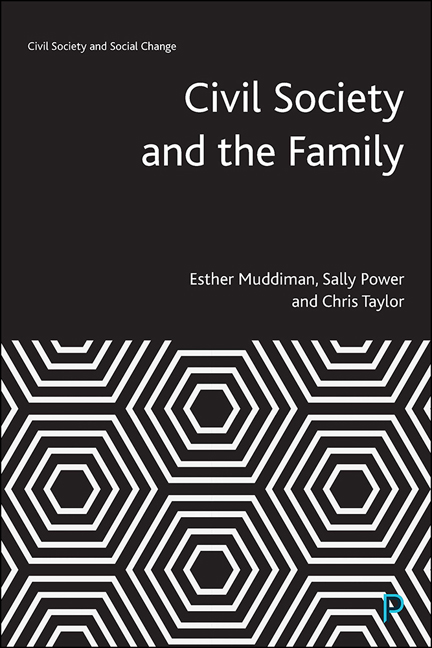Book contents
- Frontmatter
- Contents
- Tables
- Figures
- Notes on the Authors
- Acknowledgements
- 1 Starting Points
- 2 The Paradoxical Positioning of the Family and Civil Society
- 3 The Challenges of Researching the ‘Private Sphere’ of the Family
- 4 The Uncertain Business of Raising Citizens
- 5 Keeping the Faith? Secularisation, the Family and Civic Engagement
- 6 Mothers, Grandmothers and Civic Engagement
- 7 Family Arguments: Finding one’s Voice
- 8 Politicising Family Food Practices
- 9 The Upward Transmission of Civic ‘Virtues’
- 10 Reframing Civil Society and the Family
- References
- Index
10 - Reframing Civil Society and the Family
Published online by Cambridge University Press: 18 March 2021
- Frontmatter
- Contents
- Tables
- Figures
- Notes on the Authors
- Acknowledgements
- 1 Starting Points
- 2 The Paradoxical Positioning of the Family and Civil Society
- 3 The Challenges of Researching the ‘Private Sphere’ of the Family
- 4 The Uncertain Business of Raising Citizens
- 5 Keeping the Faith? Secularisation, the Family and Civic Engagement
- 6 Mothers, Grandmothers and Civic Engagement
- 7 Family Arguments: Finding one’s Voice
- 8 Politicising Family Food Practices
- 9 The Upward Transmission of Civic ‘Virtues’
- 10 Reframing Civil Society and the Family
- References
- Index
Summary
Introduction
This book set out to explore the relationship between the family and civil society. Along with Ginsborg (2013), we have argued that the role of the family in civil society has been largely overlooked in the social sciences, with the two domains often being presented as completely separate and, in some cases, as oppositional to one another. Our goal has been to empirically investigate the extent to which family relationships and connections can help us to understand civic and political engagement. Rather than use this concluding chapter to provide a summary of each chapter, we revisit the overarching research questions outlined in Chapter 1 to consider both what we have learnt and where we should look next.
Does the family strengthen or weaken civil society?
Many of the sociological representations of both civil society and the family are highly value-laden. The public–private binary through which the relationship between civil society and the family is conceptualised tends to assume that civic virtues belong to civil society. In Chapter 2, we outlined how some of the positive attributes that are often associated with civil society are contrasted with the far less positive attributes of the family. All of the ‘good’ words belong to civil society: public, collective, voluntary and altruistic. Due to the supposedly oppositional status of the family and civil society, the family takes on all of their antonyms: private, individualistic, coercive and selfish. These attributions are deeply problematic. Chambers and Kopstein (2001) draw attention to instances of ‘bad civil society’. They give the World Church of the Creator in the US as an example, one member of which went on a mass shooting rampage targeting Jews, African-Americans and Asian-Americans. Since Chambers and Kopstein wrote their article, there have been many more such incidents where members of fundamentalist and far-right movements have targeted minorities. Here in the UK, the English Defence League would be one example. The consequences of ‘bad’ civil society are far more serious than advocates of civil society acknowledge. Additionally, as Phillips (2002) points out, members of civil society organisations bring with them their existing inequalities of resources, information and power. Indeed, civil society may be more rather than less coercive than other institutions.
- Type
- Chapter
- Information
- Civil Society and the Family , pp. 177 - 184Publisher: Bristol University PressPrint publication year: 2020



